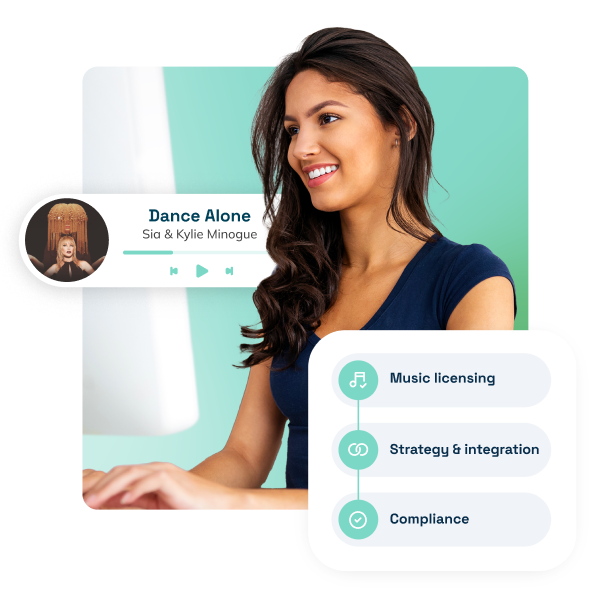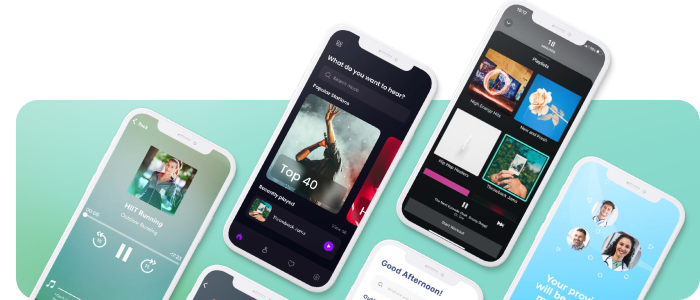2024 Guide to Music Licensing
Learn about the basics of music licensing, the costs of infringement, and how to choose and obtain the right music licenses for your business.

Chapters
Introduction
If you’re working on digital products and experiences to market, you might be interested to know that music is one of the most important elements for capturing your users’ attention, and keeping it. Music is the secret sauce that can help lengthen app session times, elevate conversion rates, and increase revenue for your company.
As you prepare to launch a new product or continue to make improvements to a current one, you may be realizing that your digital product experience just isn’t complete without music and looking for ways to remedy that situation ASAP. It’s important to note that consumer streaming services such as Spotify and Apple Music are not an option for this purpose; they cannot be used to play music publicly in a business setting, and their respective music APIs are not designed for commercial use.
Licensing commercial music for business use can be costly, time-consuming, and let’s face it, more than a little daunting. Copyright laws are complex, and it’s not at all unlikely that you could make mistakes—expensive ones—as you try to figure things out.
The good news is that at Feed.fm, we do this every day. We’ve been at the forefront of innovation in music licensing for digital businesses for nearly a decade. We created the first SDKs for legally integrating pre-cleared commercial music in apps, and pioneered a new product category—Unified Music Systems (UMS) to meet the end-to-end music licensing and distribution needs of businesses. Our team remains focused on maintaining critical relationships across the music industry to ensure that we are designing compliant music solutions that are in step with innovations across an evolving business landscape.
Feed.fm has been licensing music for businesses since 2015, has active partnerships with nearly 100 brands, and streams over 50M licensed tracks every month. Having Feed.fm as a partner means our expertise is your expertise. We’ve learned a lot along the way and appreciate the opportunity to share some best practices in our 2024 Guide to Music Licensing.
Disclaimer: Please note this is not a substitute for legal advice, but rather a quick overview of the complex music licensing world.

Music makes the difference
Music is a powerful engagement booster when incorporated into digital experiences.
Feed.fm analyzed the data for more than 8 million mobile app and connected device users, and discovered that users who listened to music integrated in an app logged 3.2x longer sessions than those who did not listen to the integrated music option. And music increased user retention by 1.7x, with loyalty increasing over time. In other words, hit music inspires people to open your app more often and engage with more of your content and offers, their devotion only growing with time as demonstrated through subscription renewals.
Music can be integrated in numerous ways for such varied industries as fitness, wellness, VR/AR (XR), hospitality, retail, digital health, gaming, and conferencing.
 Fitness
Fitness
Fitness equipment and apps can support users with optimized music experiences driving both engagement and performance.
 Wellness
Wellness
Music can enhance the effectiveness of digital content in the areas of meditation, relaxation, focus, and sleep.
 Connected devices
Connected devices
If it’s got an internet connection and a speaker, there’s value in offering branded radio and background music to capture a larger share of listening attention from your customers.
 In-flight & automotive entertainment
In-flight & automotive entertainment
Streaming music can make travel
much more enjoyable.
 Online & mobile content for websites & apps
Online & mobile content for websites & apps
Just about any digital experience can be enhanced with music.
 VR/AR (Extended Reality, or XR)
VR/AR (Extended Reality, or XR)
XR headsets can introduce music into a wide variety of experiences including virtual fitting rooms, showrooms, museums, tours, simulation training, and exposure therapy.
 Gaming
Gaming
Just ask any gamer, the music in the background of the game can be the best part of the experience.
 Hold music
Hold music
When you have to wait on hold for an extended period of time, the music really matters. Telehealth organizations and retailers can improve the experiences of both their customers and employees with hold music that soothes rather than agitates.
 Digital events & video conferencing
Digital events & video conferencing
As more and more events and conferences go digital, music can enhance those moments spent waiting between sessions and keep participants feeling engaged during the breaks.
Unlock the full guide
Submit the form below to unlock the complete guide to music licensing.

Choosing which music to license
Wherever they seek out wellness, fitness, sports, and lifestyle brands, consumers expect music to be there, too. And not just any music—your customers want quality music, custom curated for the task at hand. In the 2024 Guide to Music Licensing we'll explore a few options that are important to consider before you set out to obtain licenses.
The right music for your customers
When planning your business music strategy, start with a thorough analysis of your brand’s audience. Demographics paired with the end user’s needs and your business goals should set you on the right track. Consider the digital content on your site and the user experience you’re trying to create, and that will help you come up with the key genres and intensity levels to focus on.
Who’s listening, where and how are they interacting with the music, and what actions do you want them to take? Remember, it’s not about what music you like, it’s about what music will resonate with your customers in the digital environment you are creating for them.
Do you need popular music or will royalty-free music work for your application? Depending on your digital experience, it may be possible to find both royalty-free and popular commercial music that could fit the bill. The art is in putting the available options together in a way that meets your audience’s needs and your brand’s budget.
Do you want your music to be instantly recognizable or more of a music discovery experience? When your preferred experience calls for major-label music, will your audience be best served by hearing today’s hits, throwback favorites, the freshest up-and-coming chart climbers, or a combination of these?
The right experience for your app
Integrating music directly into an app, connected device, or other digital experience has been proven to add value when it comes to engagement and retention. How your users access and engage with that music plays a big role in the music’s success when it comes to driving key business metrics.
How will this music be experienced? Do users have to leave your product or log in to another service? Will users be able to skip around or load tracks at will (interactive)? Or will the music stream with minimal user input or control, like a radio broadcast (non-interactive)? These different approaches will change the user experience and will matter when you seek licenses.
How will you store and stream music in your app? Will you build your own infrastructure to manage this? If so, how long will it take?

The right music for your brand
Once you’ve defined your target audience and have outlined clear business goals around what you want digital music to help you achieve, it’s time to start selecting the best music for your brand. You’ll want to be sure that your brand guidelines and core values are reflected in the songs you select for core digital content as well as any background music.
Where does your brand land on the scale of clean to explicit? When licensing music for your business, it’s important to consider the appropriateness of the lyrics for your users as well as the company image you’re trying to promote. The music industry currently lacks any clear standards or enforcement for labeling songs as clean, explicit, or censored. Some unified music systems will be able to deliver a more carefully categorized assortment of music at a particular rating level, such as G, PG, PG-13, R, etc. This is of great value in establishing boundaries around the kind of music that should and should not be associated with your brand, and it’s extremely useful to have the ability to easily adjust these preferences as the need arises.
The right music for your users around the world
Where will this music be experienced? The markets or territories where you plan to launch first, or where you anticipate your users will be, will play a role in determining your licensing strategy. There is no global copyright law, so each country or region needs to be handled individually.
What if you’re unable to obtain the same licenses in all territories? Will you offer alternate music experiences in countries where you are unable to obtain specific licenses? Or will you alter your strategy and preferences to accommodate users in all locations?

The costs of infringement
Copyright infringement is a serious violation and puts your company into legal jeopardy. The financial costs of being sued, in legal fees and fines, can be astronomical. Music publishers sued Spotify for more than $1 billion and Peloton had to pay $370 million after being sued. And there is no price tag that can be placed on your company’s reputation, which can be tarnished permanently by highly publicized wrongdoing. There is no good justification for using music without permission, especially because there are now a variety of options for incorporating music legally.
If you're reading this 2024 Guide to Music Licensing, you probably want to do the right thing and are researching how exactly to obtain the proper licenses. Even businesses with the best intentions can find themselves falling out of compliance without the right resources.
Read on to learn more about licensing types and the resources available to you.
Unlock the full guide
Submit the form below to unlock the complete guide to music licensing.
Unlock the full guide
Click here to unlock the complete guide to music licensing.